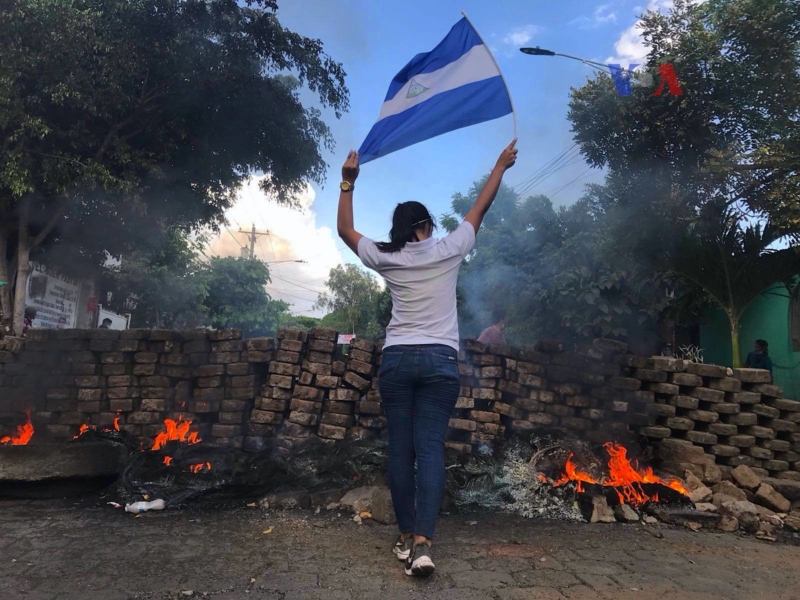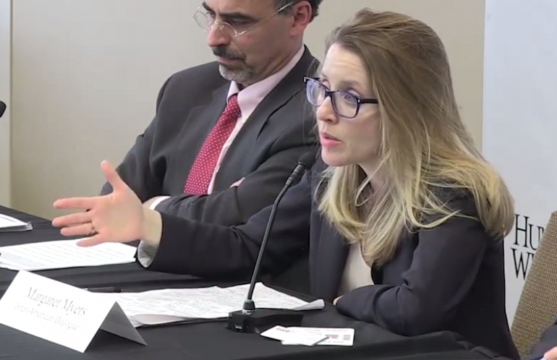A Fatal Blow to Democracy
Nicaragua is on the precipice.
A Daily Publication of The Dialogue
Nicaragua’s economy, following years of growth, has fallen into a recession after deadly street protests last year caused significant disruptions to numerous sectors. On Feb. 19, the Nicaraguan Congress accepted a $100 million loan from Taiwan, providing a line of support for President Daniel Ortega’s embattled government. Meanwhile, a tax reform plan approved Wednesday raises income taxes for large businesses, broadens the number of products subject to a value-added tax and imposes higher levies on goods such as cigarettes and alcoholic beverages. How much did last year’s protests against Ortega hurt Nicaragua’s economy, and to what extent will Taiwan’s multi-million-dollar loan help revitalize it? What are the most important parts of the tax reform, and are they economically and politically sound? How likely is social unrest to break out again this year, and what is Nicaragua’s economic outlook under Ortega’s government?
Mario Arana, director of the Nicaraguan Foundation for Social and Economic Development and former Nicaraguan minister of finance and central bank president: “Nicaragua is about to start a political negotiation process between Daniel Ortega’s government and the Alliance for Justice and Democracy after months of stalemate, which for now looks promising. More than an economic solution, the country needs a political one. Taiwan’s loan will help, and loans would help the economy much more than a tax reform. It’s not wise to introduce a tax reform amid a deepening economic recession, particularly one that intends to collect $300 million (2.1 percent of GDP), after economic growth was -4 percent in 2018 and projected estimates range from -7.3 percent to -11 percent for 2019 if U.S. sanctions are implemented. The reform’s main elements include an income tax of 3 percent, which businesses are expected to pay monthly as an anticipation of the yearly income tax; a value-added tax of 15 percent for 70 percent of a basic basket of goods that were previously exempted; increased levies for goods such as cigarettes and liquor, an important source of tax collection revenues; higher taxes for casinos; and elimination of tax exemptions, including for the agricultural sector. This is a totally unrealistic package, politically motivated and probably oriented toward dividing the private sector in the context of the upcoming political negotiations. While not an easy negotiation, the country is at an impasse and undergoing a rapid deterioration of economic and social conditions. This time, negotiations need to be more fruitful. Additionally, U.S. sanctions are imminent and entering a stronger phase. Social unrest could indeed return if a political solution is not found. That’s probably another reason why the government has been willing to engage in domestic negotiations once again. Taiwan’s loan is totally insufficient, considering the very large fiscal gap. The 2018 budget was not financed completely, a larger gap is added in 2019, and assumptions about loans from foreign and domestic sources in the budget are also unrealistic. The fiscal deficit this year (officially $700 million) is twice the size than the previous year, and it is underestimated. The fiscal and social security gaps are rapidly accumulating and leaving the government strapped for cash.”
Lucy Valenti, president of Nicaragua’s National Tourism Chamber (CANATUR): “The political and social crises that Nicaragua has been experiencing since last April dealt a serious blow to the country’s economy. Basically, all sectors in the economy have been affected, as has employment and the generation of foreign exchange. The uncertainty created by the crisis has strongly affected the financial system, which has been facing the exit of deposits from banks. This, in turn, has brought on suspension of loans, which directly affects productive activity and services. Uncertainty about the present and the future of the country given the absence of a political agreement, the lack of credit, the flight of capital, the freezing of foreign direct investment, unemployment and the drastic reduction of domestic consumption are leading the country to collapse, with all of its consequences, including increasing poverty and the closure of many businesses. Adding the tax reform—plus the social security reform, which increases employer contribution, hikes of fuel prices and the raising of the minimum wage—would practically be the ‘coup de grace’ that kills already agonizing businesses. The analysis we have carried out jointly with fiscal experts leads us to conclude that such reforms make absolutely no technical or logical sense, given that they wouldn’t lead to the government’s objective of collecting revenue to fi ll the hole in the budget. It would actually lead to the opposite. The country’s economic outlook is dark in 2019 if a political consensus that guarantees long-term stability by ensuring democratic institutionalism, the rule of law and the respect of the freedom and human rights of citizens outlined in the Constitution, is not achieved. If this is not guaranteed, a new surge of violence could occur again.”
Adolfo Pastrán, director of digital news media Informe Pastrán: “It’s evident that violence, instability, human loss, private and public property destruction and roadblocks in 2018 would have consequences. The government warned it repeatedly during the previous, failed dialogue. It brought economic losses of $1.3 billion. Taiwan’s loan will go into this year’s approved budget plan. The loan was contracted under a 20-year term, including a five-year grace period, at a six-month LIBOR interest rate plus 1 percent. It will be amortized through consecutive semi-annual installments. The government has proposed maintaining free education and health care, transport subsidies, electricity subsidies for consumers of less than 300 monthly kilowatts, and social programs. The money will help these, for the benefit of the poor. The tax reform had been pending since last year—the business sectors and the IMF knew this. Its objective is guaranteeing economic growth, employment, and the well-being and social security of Nicaraguans. It aims to restart the last fi ve years’ average of 5.2 GDP growth; continue reducing poverty; maintain free health care and education; broaden electricity coverage; and support infrastructure projects. The reform doesn’t create new taxes; it increases large businesses’ income tax from 1 percent to 2-3 percent. The increase of levies on selective products such as cigarettes and alcoholic beverages doesn’t include popular products. A tax compensation for large companies was also established. Many large enterprises participated in the reform’s consultation, giving it absolute legitimacy. Nicaragua’s government days ago met with the OAS to discuss the country’s situation, emphasizing the importance of continuing such dialogue with the end of advancing electoral reforms toward the 2021 elections. The government also met with business groups representing the private sector. Several members of the church were also invited. The meeting confirmed the need for inclusive, serious and frank negotiations. The most high-level Nicaraguan authorities have said they are open to dialogue to seek creative and realistic solutions. They have stated their commitment to permanent agreements that benefit all Nicaraguans, particularly those who fight poverty on the daily. Let’s hope for a new dialogue, one that is constructive, and which has valid mediators, and agreements for the good of Nicaragua.”
The Latin America Advisor features Q&A with leaders in politics, economics, and finance every business day. The publication is available to members of the Dialogue's Corporate Program and others by subscription.
Nicaragua is on the precipice.
What will Ortega’s landslide victory allow him to do in his next term?
How will increasing Asian investment in Latin America influence economics and politics in the region?
 File Photo: Voice of America.
File Photo: Voice of America.
 Video
Video